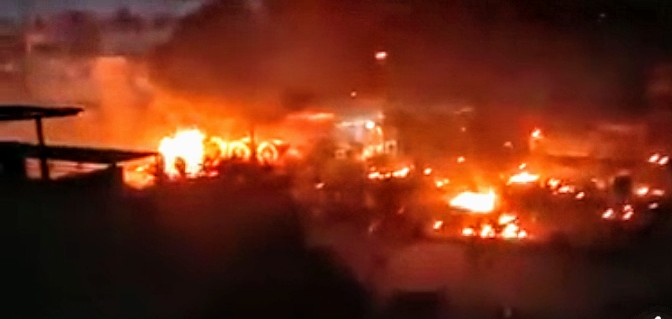Arctic Nickel Miners Recall Soviet Days Fondly
By Robin Paxton
NORILSK, Russia (Reuters) – Underpaid and isolated from an increasingly affluent Russia, workers are steadily leaving the nickel operations of Norilsk, and some of those who remain look back fondly on Soviet days.
But Mikhail Prokhorov, one of the two men who have become billionaires since buying Norilsk Nickel
Prokhorov — who announced in March that he is stepping down as chief executive as he divides his empire with partner Vladimir Potanin — is raising wages and remodeling the city to halt the exodus of skilled workers and attract new ones.
Boosted by Chinese demand for metal, nickel prices are higher than ever. Starting this month, average monthly salaries rose at least 5 percent to more than 40,000 roubles ($1,538) — nearly four times the national average.
Prokhorov, 41, says salaries should rise 16 to 18 percent annually to 2020 for Norilsk to regain its Soviet-era prestige, when it paid three times the national average for the sector.
Over 13 years, this could cost the company $2.3 billion.
“It’s not such a large sum when the company’s net profit is $5 billion a year,” said Prokhorov, who is splitting his varied assets with Potanin to focus on building a new energy company.
More than a quarter of the 210,000 people living in and around the city work for Norilsk Nickel, a $38 billion company mining a fifth of the world’s nickel and more than half of its palladium, a metal used in car exhausts and jewellery.
(See “Russia’s Arctic miners seek share of metals wealth” [ID:nL09719917] and “Russian port awaits spring thaw to ship nickel” [ID:nL09717589])
Norilsk has only 0.16 percent of Russia’s population but generates 1.2 percent of the country’s gross domestic product.
But 5,000 people are leaving every year. Until this month, workers hadn’t had a pay rise in six years. Bus fares have risen six times and heating bills and food prices are also higher.
“They have pumped out all the city’s resources. Practically none of the proceeds have come to the residents,” said Vitaly Tolstov, editor of local newspaper Norilchanin.
Surrounded on three sides by smelters, the city is cloaked in sulphur dioxide no matter which way the wind blows.
“The city is quietly dying,” said Sergei Tarakanovsky, owner of a chain of newspaper kiosks. “Before, Norilsk was a city for the young,” he said of the days when the mines and smelters were owned by the government.
REINDEER STEAKS
The city was first settled by prisoners of Soviet dictator Josef Stalin, who were exiled in 1935 to exploit one of the world’s great mineral deposits. There is still enough ore today for another century of mining.
About 300,000 people from 22 nations were held in the Gulags until they closed in 1956. The town was then repopulated by young communists from across the Soviet Union, from whom many of today’s residents are descended.
Norilsk sits 320 kilometres (200 miles) inside the Arctic Circle in Siberia. Polar nights shroud winter in darkness and temperatures plunge 50 degrees Celsius below zero.
But despite complaints of isolation and low wages, today’s “Norilchanins” enjoy some of the comforts of the outside world. Insulated behind three layers of doors, some of the more senior and better-paid workers dine on reindeer steaks, sip cappuccino in trendy coffee houses and dance to visiting DJs from St Petersburg.
Snowboarders tackle the steps leading up to the Mayakovsky Arctic Theatre and head for the ski-slope in the nearby mining town of Talnakh, built with Norilsk Nickel’s money.
Norilsk, ranked last year among the top 10 most polluted cities in the world by environmental action group The Blacksmith Institute, is also spending heavily to clean up its smelters. Workshops at the original nickel plant will be closed within three years.
Prokhorov’s other projects include a new sports complex on Metallurgists’ Square and a roof for the town’s outdoor skating rink. He has founded a Cultural Initiative Fund to attract high-profile Russian artists and perfomers to Norilsk.
“What Prokhorov has done is raise the cultural potential of the population. We’re on the periphery here, and his initiatives do a lot for the residents of Norilsk,” said local historian Natalya Boyarkina.
“We are counting on him. He promised to see through all the projects that he started.”
SHARES-FOR-LOANS
Not everyone is convinced. Tamara Sarukhanova works at a newspaper kiosk to supplement her monthly pension of 3,600 roubles ($138.5), which she would lose were she to leave for the “materik” — the frequently-used Russian word for continent.
“We live every day without knowing how we’re going to live tomorrow,” she says. Almost every customer at her kiosk is buying cigarettes, often by the crate.
Unmarried Prokhorov’s New Year exploits in the French ski resort of Courchevel, where he was detained briefly in a prostitution investigation, did not impress Sarukhanova.
“Everybody plays around, but he is the face of Norilsk. People here were so embarrassed when they saw how he was carrying on when pensioners here can barely get by.”
Others cannot forget the years after the fall of the Soviet Union when workers sold shares in the company at vast discounts. Potanin is the man most associated with a shares-for-loans scheme in the mid-1990s on which many Russian oligarchs built their fortunes.
Since then, Prokhorov and Potanin have made huge profits and ranked joint 38th in a recent survey of the world’s richest people by Forbes magazine.
Norilsk’s most modern smelter, opened in 1979, is called Nadezhda, meaning ‘hope’. But for Norilsk to flourish again, action is what is needed, says newspaper editor Tolstov.
“Norilsk’s future will not be decided by nice words.”
9-17













2007
816 views
views
0
comments